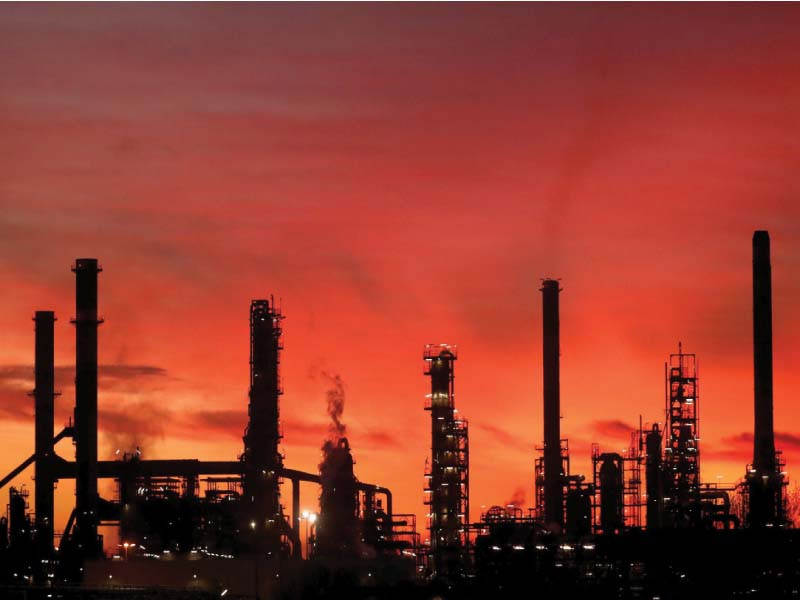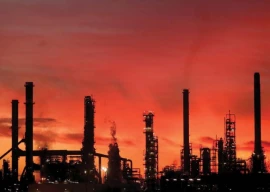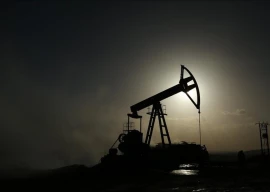
The Oil and Gas Regulatory Authority (Ogra) has finally started developing a mechanism for the recovery of exchange rate losses, caused by Pakistani rupee’s free fall against the US dollar and borne by the oil marketing companies (OMCs).
Ogra, the oil and gas industry’s regulator, held a meeting with the representatives of OMCs on March 21, where it requested them to help establish a mechanism for the exchange rate adjustment.
During the huddle, the oil industry representatives complained that the regulator had been flouting the approved oil pricing mechanism and did not allow the OMCs to timely recover the exchange rate losses.
OMCs have already conveyed to the government that they had suffered losses of Rs32 billion in just one fortnight of February owing to the sudden depreciation of Pakistani rupee.
In the meeting, the OMCs argued that Ogra was bound to settle the exchange rate losses within a month’s time in line with the oil pricing formula.
In recent months, the regulator has been settling the exchange rate losses after 90 days instead of 30 days. This has pushed the OMCs to the verge of collapse.
Ogra insisted that the OMCs should retire Letters of Credit (LCs) for oil imports after selling petroleum products in the market without incorporating the exchange rate losses.
OMCs, other than Pakistan State Oil (PSO), had also requested for allowing them not to follow the date of LCs opened by PSO. At present, oil prices are linked with the cost of imports made by PSO.
Now, in a letter to the OMCs, Ogra has asked them to submit the exchange rate adjustment they had worked out for imports made over the past six months.
The regulator referred to a meeting held last month on the exchange rate loss adjustment, which was attended by the representatives of Ministry of Energy (Petroleum Division), Oil Companies Advisory Council (OCAC), Oil Marketing Association of Pakistan (OMAP) and CEOs/ CFOs of OMCs.
In that connection, Ogra gave a brief presentation to the federal government/ Economic Coordination Committee (ECC) of the cabinet on developing a relevant policy.
According to the policy, exchange rate is to be used as provisionally available by PSO but to be converted to actual upon retirement of LC (not later than 60 days from the date of Bill of Lading). Any adjustment is to be made as prior period adjustment as per present practice, already approved by the ECC on April 9, 2020.
Other cost components (cost and freight (c&f) price of PSO, incidentals, and customs duty) may also be adjusted on an actual basis in the next fortnight.
Accordingly, in order to manage the foreign exchange impact on the import of petroleum products by the industry, it was advised by Ogra and the energy ministry that the exchange rate adjustment mechanism is linked with PSO’s payment cycle.
Therefore, in order to avoid any potential loss, the industry must align its procurement mechanism with the federal government’s prevailing policy.
Secondly, it was advised that the OMCs’ import price (c&f) should be competitive in relation with the benchmark Platts, since the federal government’s policy has benchmarked its price with the Arab Gulf Platts daily average for the number of days in the pricing period.
In order to critically review the matter, Ogra advised the OMCs to submit the working of their exchange rate adjustment for imports over the last six months within two weeks.
The working shall include the import cost recoverable under the exchange rate mechanism as per the federal government’s policy.
Secondly, the working will also include the unrecovered import cost due to being over and above the benchmarked parameters of the government’s policy.
Published in The Express Tribune, April 2nd, 2023.
Like Business on Facebook, follow @TribuneBiz on Twitter to stay informed and join in the conversation.





















COMMENTS
Comments are moderated and generally will be posted if they are on-topic and not abusive.
For more information, please see our Comments FAQ